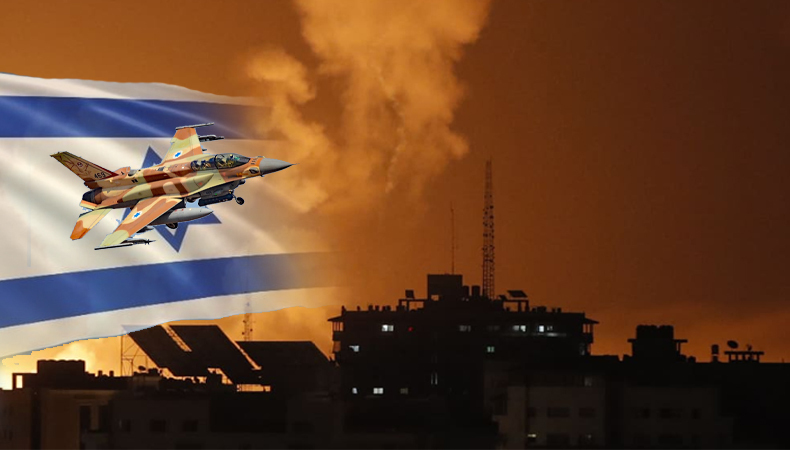Following a missile launch, Israeli jets bomb Hamas in Lebanon and Gaza

In response to rocket assaults it claimed on the Islamist organization Hamas, Israeli jets attacked targets in Lebanon and Gaza early on Friday. This came as tensions following police raids on Jerusalem’s Al-Aqsa mosque earlier this week threatened to boil over.
Ground-shaking explosions shook various parts of Gaza as Israel claimed its jets targeted Hamas weapons factories and tunnels, which are in charge of the blockaded southern coastal enclave.
As dawn drew closer, the military announced that it had also hit Hamas sites in southern Lebanon, where locals in the Rashidieh refugee camp had heard three large explosions.
Israeli officials blamed Hamas for the rocket attacks that came from Lebanon and targeted northern Israeli communities. According to the military, out of the 34 rockets fired from Lebanon, air defense systems were able to intercept 25 of them. It was the largest such assault since Israel and the heavily armed Hezbollah militia engaged in combat in 2006.
Read | Israeli attacks in Syria became more frequent, escalating tensions with Iran
Benjamin Netanyahu, the prime minister, declared at a security cabinet meeting that Israel’s response, both tonight and afterwards, “will exact a significant price from our enemies.”
No significant deaths were reported, despite the fact that rocket salvos and sirens sounded in Israeli towns and cities bordering Gaza while Israeli jets hit there.
The cross-border attacks happened as tensions over Israeli police incursions at the Al-Aqsa mosque compound in Jerusalem during Ramadan, which this year falls around the Jewish Passover holiday, were rising.
In a statement, Hamas claimed that it “holds the Zionist occupation fully accountable for the grave escalation and the flagrant aggression against the Gaza Strip and for the consequences that will bring onto the region.”
Although Ismail Haniyeh, the leader of Hamas, was in Lebanon at the time of the strike on Thursday, Israel blamed Hamas, but security experts thought Hezbollah was responsible.
Despite the fact that the killing was not carried out by Hezbollah, Tamir Hayman, a former head of Israeli military intelligence, claimed on Twitter that it was difficult to think that Hezbollah was unaware of it.
Najib Mikati, the prime minister of Lebanon, condemned any military activities from its territory that endangered stability in a statement, but Hezbollah did not immediately respond. Hashem Safieddine, a senior Hezbollah leader, stated earlier on Thursday before the missiles were fired that any attack on Al-Aqsa “will inflame the entire region.”
The deteriorating security situation complicates matters even more for Netanyahu’s religious-nationalist administration, which has already had to deal with widespread opposition to its now-suspended plans to limit the Supreme Court’s authority.
Nevertheless, following the rocket attack, opposition leader Yair Lapid said the government could rely on cross-party support, and Prime Minister Benjamin Netanyahu stated Israelis supported the security services.
“We will strike against them whenever and wherever required, regardless of the internal debate in Israel. We are all in agreement on this, without exception,” stated Netanyahu.
Large plumes of smoke were seen rising above the northern Israeli border town of Shlomi after the rocket strike on Thursday, and there were damaged vehicles all over the streets. The northern airports in Haifa and Rosh Pina have been shut down, according to the Israel Airports Authority.
The United Nations peacekeeping force in south Lebanon (UNIFIL) issued a statement in which it referred to the circumstances as “extremely serious” and urged calm. According to UN representatives, the UN was in touch with the parties concerned to attempt and defuse the situation.
After a year of increasing Israeli-Palestinian violence, the UN Security Council met behind closed doors to examine the problem amid worries that it could worsen.
Robert Wood, the deputy ambassador of the United States to the UN, told reporters as he arrived at the meeting: “It’s going to be important for everyone to do what they can to calm tensions.”




